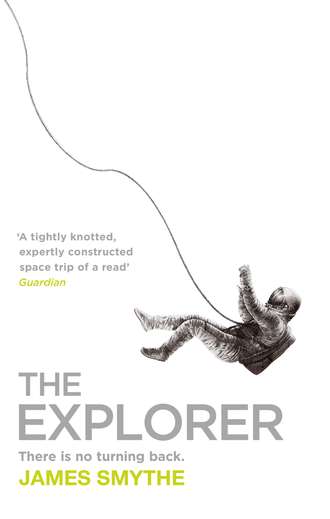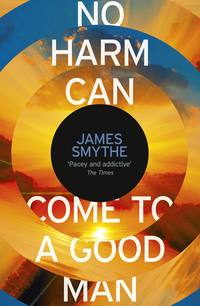
Полная версия
The Explorer

JAMES SMYTHE
THE EXPLORER

Copyright
HarperCollinsPublishers
1 London Bridge Street
London SE1 9GF
www.harpercollins.co.uk
First Published by HarperVoyager 2012
Copyright © James Smythe 2012
James Smythe asserts the moral right to be identified as the author of this work
A catalogue record for this book is available from the British Library
This novel is entirely a work of fiction. The names, characters and incidents portrayed in it are the work of the author’s imagination. Any resemblance to actual persons, living or dead, events or localities is entirely coincidental.
All rights reserved under International and Pan-American Copyright Conventions. By payment of the required fees, you have been granted the non-exclusive, non-transferable right to access and read the text of this e-book on screen. No part of this text may be reproduced, transmitted, down-loaded, decompiled, reverse engineered, or stored in or introduced into any information storage and retrieval system, in any form or by any means, whether electronic or mechanical, now known or hereinafter invented, without the express written permission of HarperCollins.
Source ISBN: 9780007456758
Ebook Edition © December 2012 ISBN: 9780007456772
Version: 2016-09-26
Contents
Cover
Title Page
Copyright
Part One
Chapter 1
Chapter 2
Chapter 3
Chapter 4
Part Two
Chapter 1
Chapter 2
Chapter 3
Chapter 4
Chapter 5
Chapter 6
Chapter 7
Part Three
Chapter 1
Chapter 2
Chapter 3
Chapter 4
Chapter 5
An Extract from The Testimony
Acknowledgments
Also by James Smythe
About the Publisher
PART ONE
I had the ambition to not only go farther than man had gone before, but to go as far as it was possible to go.
– Captain Cook
1
One of the first things I did when I realized that I was never going to make it home – when I was the only crewmember left, all the others stuffed into their sleeping chambers like rigid, vacuum-packed action figures – was to write up a list of everybody I would never see again; let me wallow in it, swim around in missing them as much as I could. My name is Cormac Easton. I am a journalist and, I suppose, an astronaut. Part of my job on the ship was to be in charge of the communications with home, taking video and writing updates, sending them back to Earth directly. There wasn’t a guarantee of how long any of the broadcasts would take to get there – if they got there at all, as far out as we were, what with the chance of interference – but it was something. It was how I had been sending all my reports, but I assumed that they’d know what to do with something more personal, that they would pass it along. The list was deep. Elena was at the top. I had missed her before we’d even left. On the days leading up to the launch I had been trying to get hold of her, leaving messages, telling her how I felt, because what screwed us up was this, my job, this trip; and I wanted to see if, when it was all over, we could try again. There’s always hope, that’s what they say. As soon as I worked out that there wasn’t ever going to be that chance for reconciliation? It became something else. I wasn’t missing her any more: it was despair, maybe, or another word for when you fall apart, when you can’t cope, when it all crumbles. I hid my feelings from my crewmates because I didn’t want to ruin their trip, didn’t want to bring them down. That went into my messages. I told Elena that I missed her, and that I would always miss her, and that, if there was a God, we would see each other again someday, even though I didn’t believe that. It just felt right to write it, in case.
Some other people that I’ll never see again: My parents, my mother and father. My parents are – were – teachers. My mother left my father in the late stages of their lives, post-retirement, and he decided to cut himself off from me completely. In books, they say that familial rejection is often a direct result of one’s coping mechanisms, but I think he had been looking for an excuse. We barely ever got along, and when he disappeared, he really disappeared. No phone call on my birthday, no letters, nothing. It’s been over five years since I’ve seen him. He might be dead for all I know. Sometimes that’s what I assume. It’s easier than explaining what really happened. My mother died six months ago, something to do with her heart, and my father didn’t come to the funeral, or call, or anything. I had a cat as well, though he was missing when I left, which was typical – a packed suitcase on the bed usually meant a holiday, and he went off and hid somewhere, unforgiving of us for abandoning him. It was bad enough with Elena gone, frankly. My friends, though they all lived elsewhere, kids and jobs and the breakup with Elena dividing us. And then my crew: the crew that I came out here with, that I started this journey with. My crew died in bits and bobs, dribs and drabs, up here, with me. My crew: I was never really a part of them, even after all the training, because they knew more than me, technical things. This trip relied on them to happen. I was chaff. Civilians never fit in completely; those people had been training their whole lives. I was here for PR purposes; they were here for the science. I would argue that I was here for the adventure, as well, for the sense of exploration: they would understand that, I think, but I can’t tell them that now. They died one by one, falling off like there was a checklist. First to go was Arlen.
Arlen was First Pilot, from somewhere in the American Mid-west – Ohio, I think, but he spoke about the country as if he’d lived all over, throwing names of cities and towns into conversation, always with a tale to tell about them. He was a storyteller, one of those types, and older than the rest of us by a few years. When we all met he was clean-shaven, but he grew a beard for the trip, because he wanted to see what happened to it when we were in stasis.
‘When we get out,’ he said, ‘this sucker might have grown. I want to know just how frozen we actually are in those things.’ We were only in them for a fortnight, but he said that if it grew fast enough he’d be able to tell the difference. He thought that it would be hilarious if it grew so fast he would go from tidy to unkempt over the course of a single sleep. He was all about the joke, Arlen. He died in stasis, or just didn’t wake up, however you want to think of it. We all came out of the pods one by one, as we had in training: his was meant to be first, so that he could switch on everything, run diagnostics before the rest of us turned out; but, for some reason, his bed didn’t open. By the time we prised it open he was gone. Something must have happened to it during the launch period, because everything was fine when we got into them; we had run stress tests to make sure, and those things were meant to be idiot-proof. In a worst-case scenario, they were even meant to be our escape pods: the thought of one malfunctioning didn’t exactly fill us with confidence. We all came out of our pods soaking wet, because something about the sleep made you sweat, made your entire body lose its water. Arlen wasn’t wet: his skin was a filthy grey-blue, hard and crusty and starting to flake off in fingernail-sized chunks of dust. We tried using the defibrillator on him but nothing happened. The skin cracked, and his eyes were so dry they looked like marshmallows, and we realized that we were going to have to put him back and seal him off. We said some words, told Earth, a few of us cried; but that wasn’t a mission ending critical, as Ground Control called it. That was why we had more than one pilot.
‘Things can go wrong,’ Ground Control told us. ‘You have to be prepared.’
Second to die was Wanda. We jokingly called her Dogsbody, because she got all the awful jobs, and pretty much did whatever her superiors told her to do. That included me, for some reason; even though I had no official rank, she acted as if I did. Respect, maybe, or honour. Something. She had been recruited straight out of some Ivy League university, and she acted it. When she did what we asked, it was always grudgingly, and she was surly, sad. We speculated that she really missed home. She was American as well – she and Arlen, the American contingent, first into action, first to leave, like some old joke about one of the wars – and her accent was Southern, but she always said that she was from DC. We had something in common: headaches. I get bad headaches in low gravity, which I didn’t realize, of course, until we were up here. I think most people have the potential to get them, over long periods of time. It’s the pressure. I never had headaches before we came up here, and neither did Wanda. We were the worst to get them – or, maybe just the worst to feel them, at first, before we got used to them. Wanda died outside, in space. Her suit had a tear, or a crack, and we ran so many checks, over and over on all the suits, that when she died we couldn’t believe it. There was a routine maintenance scan on the hull every few days; we cut thrusters, made sure that the outside was holding up, that the hull’s integrity was normal. We were pushing ourselves into new parts of space; the first time that we had been here, manned, this far out. The hull could have developed issues, so we sent Dogsbody – Wanda – out to check it, on her wire, and we ate breakfast. She reached the apex of the craft and her line went taut, and she drifted off, her helmet filled with blood, thick enough that we couldn’t see her face. When we dragged her in her eyes had burst behind her eyelids. Her head had drowned, really, flooded the helmet like a bathysphere, like a goldfish bowl. She’d kept her mouth shut, squeezed her eyes shut like we were told in cases of depressurization, but her nostrils … We hadn’t even thought about the nostrils. Guy suggested that we all wear earplugs in our noses after that, when we went on walks, but we didn’t, because we knew that if the helmets failed us, no amount of plugging cavities was going to keep us alive.
Guy was third. He was German, and that wasn’t his real name. His real name was Gerhardt, but we had to prise that out of him, really bully him to tell us. He hadn’t used that name since he was a child, he said. To hear it made him angry. Guy suited him better. Gerhardt suggests a fat man, a chef, huge and mustachioed and swirling. That wasn’t Guy, who was thin and tall and bald, almost hairless. He was chief scientist and engineer. We debated turning around after Wanda died, head back to Earth whether Ground Control gave us permission to or not – could we even do that? The systems weren’t meant to put us in reverse until half the fuel had been depleted, but Guy helped develop the tech that made the ship run: he would almost definitely know the safe codes to reprogram the systems, to manipulate our journey, change the coordinates, change where we were heading. Everything was safe codes and protected routes that we weren’t able to change. We went silent as we put Wanda’s body back in her stasis pod, stopped – although, we never actually stopped, of course; we were always drifting, because that was the nature of space, no stopping, nothing ever ceasing – and we sent a message home, and waited for the reply. There was an eight-minute wait for messages to reach home at that point – four minutes to send it, four to get the reply, but we had to give them extra time for any anomalies. We sent the message a few times, to make sure, and waited and waited. Eventually, they told us we were carrying on; that we couldn’t afford to stay still, that we should turn the engines back on a.s.a.p. The life support in the ship is piezoelectric, charging itself from the vibrations that the hull makes as the engines rattle it, so as not to deplete the fuel supply; the longer the ship stays static, the less time life support has. The ship was built to keep us moving. We were told that we had to progress, that Wanda’s death wasn’t crucial, so we did, for a while. Quinn and Emmy didn’t like it: they argued, wanted to turn around. I supported them, and when they told Guy that they were turning the ship, it turned into a full-blown argument. Quinn was screaming at him, using nothing other than a sense of morality as his argument (people had died, we owed them something) and self-preservation (people had died, and there might be more), and Guy grabbed the walls suddenly and he had a heart attack, scrabbling at his chest with his hands, beating at it like he was fighting off another man, an actual physical attack. In zero gravity it was scarier than seeing it normally; normally you imagine people crumpling to the floor, but Guy was a cartoon version, a terrified and confused wolf plummeting down a ravine, clutching at his chest as he fell. As Emmy kept saying that night, consoling us, or trying to: it would have happened anyway. And Guy had been losing it: he accused me of things, started getting paranoid, seeing things. There’s no telling what this amount of pressure can do to the human body, let alone to the mind. We were past any point where anybody had been before, and we had to accept that, and move on. We were as fit as we could be; we would either cope or we wouldn’t.
Quinn was next to die; and with him, it became almost funny, or like a setup for some awful TV show, where you expect the presenter to reveal that it had all been an overly elaborate joke. He was the second pilot, though he always referred to himself as a caretaker.
‘I only push the occasional button,’ he told me in his first interview. I am a journalist. That’s why I’m here, that’s my motivation, to document this, to take film clips, to write about this. We live in a time of interest, of being able to remember this stuff forever: it’s not like when it was paper, which faded and peeled and tore. Data lives forever, and we’re in a new age of journalism: the age of permanence. I could win a Pulitzer for this, everybody said before we left. I was writing up the adventures of those who go further than anybody ever has before. This is the stuff of sci-fi movies and books, of dreams: it’s humanity exploring again, crossing the deserts, reaching the poles, scouring the depths. We’re doing it because we can, is the first line in my article. In the film of this, I am the fourth actor’s name to appear on the screen. I’m the everyman. The stars are Arlen – it’s a shock twist when he dies so early, so his part is almost a cameo – and Quinn, but Quinn’s face is biggest on the poster. Quinn was handsome, charming, roguish. All those things. He looked like a prince, or some sort of Arabian herald; dark hair, sharp jaw, blurry blue eyes that were at odds with his heritage. Quinn was British-Sri Lankan, but had spent most of his youth in California. He had a curious English drawl, slipping into it when he asked for stereotypes, for tea, for a sandwich, to wear some trousers, but the rest of the time it was pure West Coast, smooth and swift. Quinn died when I was outside the ship, working on some wiring to try and get control of the computers. We shouldn’t have been out alone, but we were down in our numbers. We had lost all contact with Ground Control, so we panicked; he was trying to turn the ship around, which meant overriding the systems, which meant working on something outside the ship as well as the computer system inside the ship at the same time. When I came back Emmy was crying, absolutely hysterical. Irreconcilable. I couldn’t make out what she was saying, but she was gone, inconsolable, and Quinn was on the floor, his eyes rolled right back, blood around his head because he’d fallen down – the engines were off, and we were still, and gravity, being what it is, had taken its toll – and he had hit his head on the wall at the wrong angle, a cruel accident, the sort of thing that could have happened to any of us, and I couldn’t even get Emmy to try to save him because she wouldn’t stop screaming. I looked in her eyes, and she was just petrified. It was terrifying, really. There was blood on her hands, and it looked like – or, it could have looked like – she was responsible, but she didn’t say anything about it when I asked her, and I had to have faith. I had to. When I had cleaned up the mess and turned the engines back on, I bundled his body into the stasis beds – have you ever tried to move a body in microgravity? It floats and wobbles and hits you, inadvertently, and you almost forget that it’s a body, because it’s suddenly all physical mass and form, but with no weight behind it – and sealed it up, all the bodies there, peering out until we got home. They all looked like they were asleep, apart from Wanda, with the blood around her eyes. I don’t know why we didn’t wipe it before we put her to sleep. And then there were two. Last – apart from me, if I’m going to die – was Emmy.
Emmy died – I use that word, but, really, maybe it’s not that bad, maybe there’s something can be done, I don’t know – only hours after Quinn, really. We were barely speaking, because something had gone wrong with her, I think, in her mind. That was the other thing they warned us about: snapping. She seemed to blame me for the deaths of the others, and she wouldn’t look at me, not properly. She screamed at me that it was my fault, that I was somehow responsible for everything. She called me a murderer. We didn’t speak, and she refused to sleep. Eventually I worried about what would happen to me when I slept – because she seemed, suddenly, like she could do something – so I had to keep her sedated most of the time, strapped into her bed. They had warned us, when we did all the training, that this would be psychologically tough. I seemed to be fine, but Emmy bore the brunt of their warning. They bandied around words in training, in a joking way, but you never knew if they were actually joking. And then after our journey, and all the deaths! How could you stay sane? Even I don’t know how I’ve held up; if I’ve held up. We powered down and I sent another message back, not knowing if it would reach home, but praying, and praying that, somehow, they could reply, and we let the time tick as the life support system whirred. With only the two of us we knew we had enough life support to stay there for a day or so – a full complement of 6 had 6 hours, so we did shaky maths based on the sizes of our lungs, and the backup tanks that we could wrench from the now-spare suits and fit to the system. So we sat, and she was silent until she finally decided to speak to me. She sounded so threatening, like some villain from a movie, telling me that she was fine, trying to psychoanalyse me, getting nowhere. When I was scared enough – for my life, for what she might try and do when I slept or when my guard was down – I was forced to put her to sleep. I had to. I had to sedate her, and then I put her in stasis until we could get home, when they would wake her up and fix her. I had to.
That was a couple of days ago. She missed the best part of the trip, when we – I – hit our fuel limit, the 51% mark, when the ship was meant to turn itself back, send us all home. It didn’t. I watched it creep to 52%, and then tick over, and I waited for something to happen. I assumed deus ex machina: there would be clanking, something mechanical, and the ship’s engines would kick in, boosters taking us into that beautiful curve, and then I’d suddenly see Earth in the distance, a pinprick of light. I would get to watch this all on the monitors, trying to remember the star formations that we had passed, laughing as a formation that was on our left was now on the right, as I tripped past it and gaily waved. I watched it creep to 50 from 51, and then I stopped the ship. That much I knew how to do: there is a pause button, big and green, like you would find in a cartoon. All systems are frozen before they shut down automatically. They are kept on a hyper low-energy standby to preserve them, like a TV set or a computer. They Ding! when you bring them back online. When there’s a problem, a red light flashes and there’s a beep, a long, solid, irritating beep from the system speakers. The designers must have loved sci-fi films. I froze the systems so that, when they came back on, they would kick-start. I imagined the computer’s AI as being like a late student, realizing that the alarm hasn’t gone off, and then running to compensate. It wasn’t, and when I rebooted all I got was more forward movement. I spent 2% percent of the fuel wondering if we had already turned, and were heading in the right direction, heading home, but we hadn’t and we weren’t. That was that: I travel forward until I run out of fuel, and then I use the life support – a week, maybe, given that it’s just me, if I breathe in shallow breaths and then rely on the spare O2 tanks in the external suits – until I run out of air, and then I die. In many ways, it’s calming, knowing that it will probably happen: I remember reading something in the papers years ago, an article about a journalist who knew that he had cancer, knew that he was going to die, and said that it eased him. He moved on, and he had his family move on as well. There were rumours that his wife started dating before he was even dead, because that’s what he wanted. Not everybody reacts that way, but he did: he found a tranquillity in it.
All that I’ve got up here is tranquillity now, I suppose.
2
I eat meals by myself; or, rather, I eat them in the room with all the sleep pods and my dead colleagues, because it’s either that or the cockpit, or one of the other parts of the ship. We’ve got expansive engine rooms; massive chambers full of tech that I don’t understand, all to process the air and the water, keep us going; and storerooms, spaces that would be empty if they weren’t filled with crates of supplies we’ll never use. The power supply is cutting edge; until a year ago, it was touch and go as to whether they’d get it down small enough to actually even launch. They did. I don’t know how we ever doubted them.
It’s amazing how fast you can get bored. Emmy’s been dead for two days – I keep using that word, because in an ordinary situation we would get home and she would be brought out of sleep and somebody would be able to help her, with drugs or surgery, something to balance her. But here, she’s dead. I know that we’re not going backwards, and no pods have returned to the ship to tell me their rescue plan. I mean, not that they could have one in the first place. It would take them so long to reach me that I’d be dead by the time that they did. There is no Plan B.
I’ve become like a vampire, sitting here in the dark on my own, lusting for something – anything – other than this, other than here. I’ve turned the lights off – I flicked the switch when the computer shouted that we were crossing paths with an asteroid (Nereus, the on-screen prompt told me), just to look at it, really. Couldn’t see it though, the real version. There’s technology on the screens that shows you images, composites of what’s really out there with CG stuff, to give you information. It painted in the path of the asteroid for me; I see its tail in the distance, as it runs towards Earth, where it’ll swing around, passing close enough for bedroom-astronomers to get excited. From here, Earth is a speck, a twinkle, a flash of light. We were in space for two reasons. Guy was running tests on anomalies, things that probes and satellites and telescopes couldn’t even begin to fathom, all to further our knowledge of space. That was only the secondary reason, though: science taking a back seat to something less tangible. Our primary remit was to inspire people, to be explorers. To show the people of Earth that we – as a race – were able to take ourselves further, to push our limits, our scope. Nobody explored any more, so we were the new vanguard. It was so exciting, so important. We were going to be heroes.









